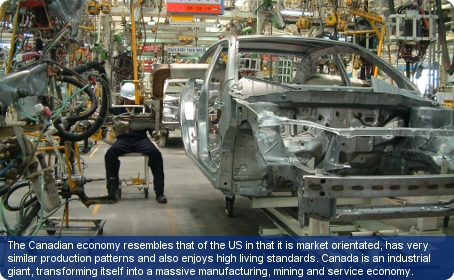Find a business in Canada

Canada is an industrial giant with an economy in the trillion-dollar class, and a resource-rich country that contains many different minerals and metals, ranging from aluminium and copper to gold and diamonds. It is the second biggest country in the world and has the longest coastline of any country, but it is sparsely populated. It has a GNI per capita of US$50,970 (2012) and has seen GDP growth of 1.1% per annum 2008-12. Ontario is the centre of economic activity and the city of Toronto is the leading financial and services centre. The Canadian economy is one of the most open in the world and has enjoyed strong growth from the mid-1990s to 2008.
The wealth of natural resources that can be found in Canada have enabled it to generate significant revenue. Resources such as: minerals, petroleum and natural gas, forests, extensive coastal waters for fishing, and rivers and falls for hydroelectric power. Canada has around 175 billion barrels of proven oil reserves and 1.75 trillion cubic metres of proven natural gas reserves. Canada accounts for the third largest oil reserves in the world after Saudi Arabia and Venezuela, with a significant proportion of these located in the Athabasca Oil Sands region, Alberta. In 2010 this region was producing 2.1 million barrels per day, and accounted for 74% of Canada’s total oil production. It is also the largest producer of uranium globally. As a result, the mining industry contributed $32 billion to the country’s GDP and employed some 306,000 people in 2009 (CAD31 ($US33) billion dollars it was in 2010).
The 1989 US-Canada Free Trade Agreement (FTA) and the 1994 North American Free Trade Agreement (NAFTA) have had a significant impact on the Canadian economy and are the primary reasons for the dramatic increase in trade and economic integration with the USA. Exports account for approximately 35% of GDP and as Canada’s principal trading partner the USA takes 85% of the country’s exports. Canada enjoys a substantial trade surplus with the USA and is its neighbour’s major foreign supplier of energy, including oil, gas, uranium and electricity.
Since 1940 the country has transformed itself from being predominantly agricultural and rural in nature into a massive, manufacturing, mining and services economy. The Canadian economy now resembles that of the USA in that it is market orientated, has very similar production patterns and also enjoys high living standards.
Canada is ranked 13th out of 183 in World Bank’s ‘Doing Business 2012’ study and 3rd best in the world for starting a business and resolving insolvency. These rankings measure the conduciveness of a regulatory regime in starting and operating a business. Its economy is one of the most open in the world and Canada can claim to one of the best countries in the world for business.
Canada has many highly skilled and skilled workers. In 2010, 30% of people over the age of 15 held college or trade certification, along with 20% attaining university-level education. Additionally, 50% of immigrants who arrived between 2001 and 2006 held a university education. Like many developed countries, Canada has experienced a shift away from manufacturing industries towards services. Consequently, just over three-quarters of Canadians now work in the service sector (2007).



